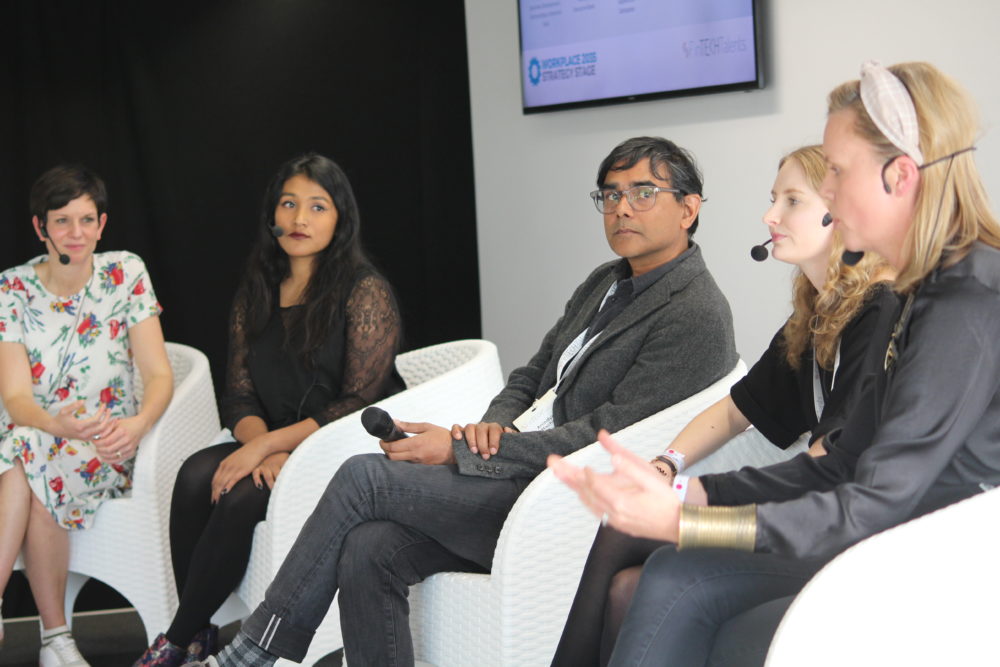
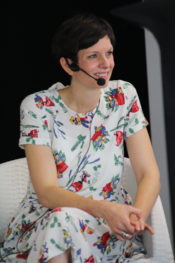
Lucy Woolfenden, Yolt: “What are the myths and realities?”
Yolt, the smart thinking money app, took part in FinTECHTalents to debunk myths around millennial money habits and stereotypical career paths. Our aim: to correct myths and unjust stereotypes whilst showing there really is no single way to reach your career goal.
Indeed, 65% of jobs that the next generation will do don’t even exist yet. With this in mind, we talked to our panel about how we can better future proof our futures and those who are coming up behind us. The discussion was diverse – exploring different myths and stereotypes that had faced our panelist from not attending university, to coders being untouchable wizards.
Here’s a little snippet of each of our panels’ stories as we asked them what their pathway into Fintech was, and whether this was the career they had envisioned when they started out.
Claudia Coppenolle, Director Digital Cash Products, Deutsche Bank, @chonerlage
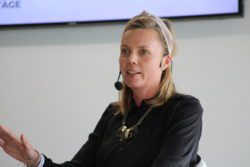
Claudia Coppenolle, Deutsche Bank: “Always invest in yourself.”
My pathway into FinTech was definitely not planned as such. It was more a matter of the right opportunity at the right time and not shying away from it. I always had a natural curiosity for emerging technology, especially the really disruptive ones like crypto and Blockchain fascinated me, and it was just a co-incident that there was a role available in my organisation when I returned from maternity leave. My personal lessons learned and to share are:
- Always invest and involve yourself in areas that are of interest to you, as you never know when the next opportunity to work in that field presents itself.
- There is no such thing as the right time or wrong time to take on a new role or make a career change, you will only really know when you try – so go for it!
Nina Mohanty, Business Development Manager, Bud, @ninamohanty

Nina Mohanty, Bud: “I never dreamed I’d end up where I am today.”
I never planned on a career in FinTech– in fact, it was the last thing I expected to do. I stumbled into FinTech, rather serendipitously, one summer while I was completing my Master’s degree. One afternoon, I found myself at MasterCard presenting an idea for an app that would utilize a digital wallet and the next thing I knew I was working in the Digital Acceptance team. That summer, I was introduced to MasterCard’s Start Path incubator, which opened my eyes to the amazing FinTech businesses changing financial services armed with a rag-tag bunch of developers, a big idea, and lots of free t-shirts (because what is FinTech without swag!).
Later, I worked at Starling Bank and saw the power FinTech could have in changing customers’ relationships with money for healthier financial lives. Most of the introductions I had to fantastic FinTech companies and people was and remains, through social media, and that is how I eventually landed at Bud, where we are building the financial network. The career path I’ve taken is far from my university dreams of being a US Diplomat or more adventurously a CIA agent as I pursued my degree in International Relations. I never dreamed I’d end up where I am today, but I can’t imagine doing anything else and I look forward to seeing where this winding journey takes me next!
Ellie Brown, Programme Delivery, Santander
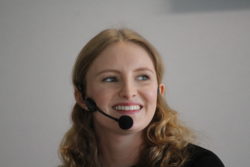
Ellie Brown, Santander: “It’s hard to assert your power if you can’t put your knowledge into practice.”
My pathway into FinTech was via the Apprenticeship route, directly into the financial industry. Whilst I work for a bank, my Business As Usual (BAU) tasks are far from banking and are heavily involved in digital technology, whether it be cyber security, threat intelligence or software engineering for the bank – I am always surrounded by technology. If I had been asked three years ago where I saw myself in 2018, my answer would have probably been “studying Computer Science at University”. Whilst the field of study is not far wrong, the pathway is a world apart. Putting myself directly into the world of work was a decision not taken lightly as I always considered myself an academic.
Yes, I am still studying as my degree is sponsored by my company, however I am getting the polar opposite experience to that of a typical student. Since being enrolled on the apprenticeship I have valued the importance of hands-on experience and ‘learning by doing’ a lot higher than the academic side of knowledge. Knowledge is power, but it’s hard to assert your power if you can’t put your knowledge into practice.
Anindya Bhattacharyya, Software Engineer, PensionBee, @bat020
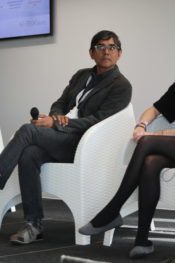
Anindya Bhattacharyya, PensionBee: “You don’t need to be a ‘wizard’ to be a developer.”
I trained as a journalist on leaving university and spent much of the 1990s reporting on the burgeoning derivatives and risk management industry in the City, before moving on to a variety of subediting and news reporting jobs.
The rise of internet technologies was one of the most exciting developments that I witnessed as a journalist. But it also led to a crisis for the publishing industry. Revenues collapsed as consumers discovered they could get their news for free.
By the middle of this decade my career had stalled and I decided a radical change was in order. I’d kept up an amateur interest in technology and understood the basics of how web technologies worked. So maybe I could switch from writing prose to writing code.
In 2015 I took a deep breath and enrolled with Makers Academy to train intensively for 12 weeks as a software developer. Makers took in people from all sorts of backgrounds and it was ideal for someone like me with an unusual background looking to switch careers.
I started at PensionBee shortly after my Makers course – our chief technology officer Jonathan Lister had approached Makers looking to hire a junior software engineer. I’ve been here now for a couple of years and developed my skills and experience as the company has grown. Our mission at PensionBee is to make pensions simple, and this throws up all sorts of fascinating technical and business challenges that I can get my teeth into.
Overall I’d thoroughly recommend switching to a career in financial technology to anyone in a similar or comparable situation to me. My only regret is not taking the plunge earlier. There’s a damaging stereotype that coding is some kind of magical art that only “wizards” can master. The truth is that anyone can do it – and encouraging a diversity of backgrounds and experiences benefits everyone in the long run.
To see what else Yolt has been up to, check out Yolt’s blog.











